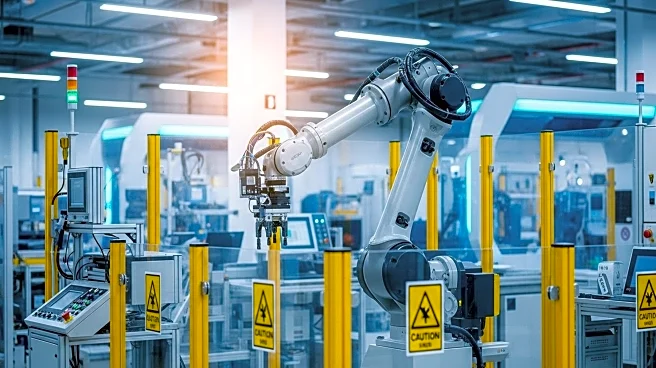What's Happening?
Hyundai Motor's $7.6 billion auto plant in Georgia has been under scrutiny following the deaths of three workers since construction began in 2022. According to a report by the Wall Street Journal, the plant has experienced numerous safety issues, including accidents involving inexperienced immigrant laborers and lax safety standards. The plant, a joint venture with South Korea's LG Energy Solution, has also been the site of a significant immigration raid, where hundreds of South Korean workers were detained for allegedly working illegally. Hyundai CEO Jose Munoz has emphasized the company's commitment to safety, stating that it prioritizes worker safety over production schedules and profits.
Why It's Important?
The safety concerns at Hyundai's Georgia plant highlight significant issues in workplace safety and immigration compliance within the U.S. manufacturing sector. The involvement of immigrant laborers and the subsequent immigration raid underscore the complexities of labor practices in large-scale industrial projects. These developments could impact Hyundai's reputation and operational efficiency, potentially leading to increased scrutiny from regulatory bodies and affecting investor confidence. The situation also raises broader questions about the enforcement of safety standards and immigration laws in the U.S., which could influence future policy decisions.
What's Next?
Hyundai has pledged to address the safety issues at its Georgia plant, with CEO Jose Munoz personally visiting the site to reinforce the company's commitment to worker safety. The ongoing construction of the electric vehicle and battery plant suggests that Hyundai will need to implement stricter safety protocols and training programs to prevent further incidents. Additionally, the aftermath of the immigration raid may lead to increased regulatory oversight and potential legal challenges, which could affect the timeline and cost of the project.
Beyond the Headlines
The situation at Hyundai's Georgia plant may prompt broader discussions about the ethical implications of using immigrant labor in large-scale industrial projects. The intersection of safety, immigration, and labor rights could lead to increased advocacy for more stringent regulations and protections for workers, particularly those from vulnerable communities. This development may also influence cultural perceptions of corporate responsibility and the role of multinational companies in ensuring safe and fair working conditions.










